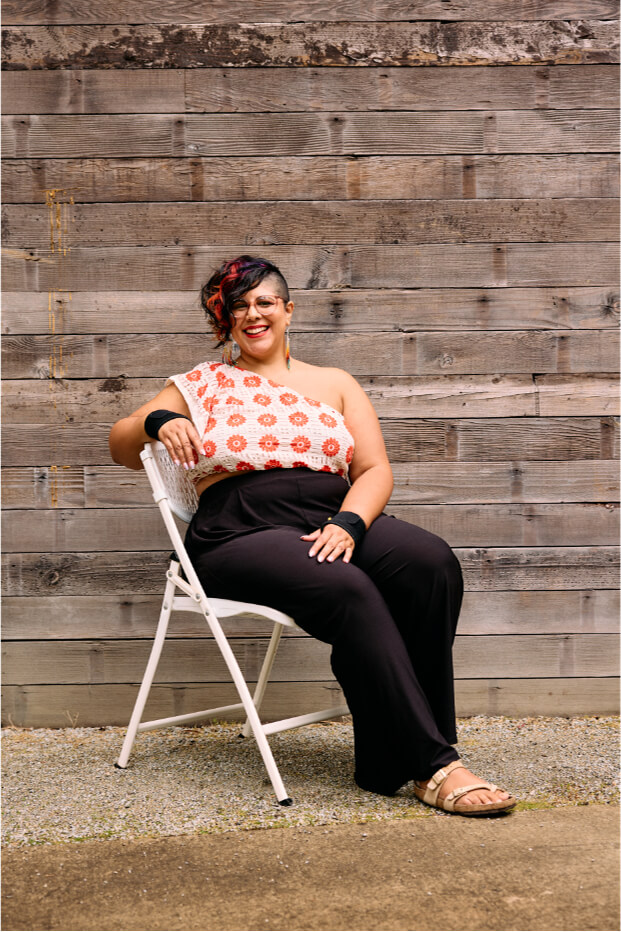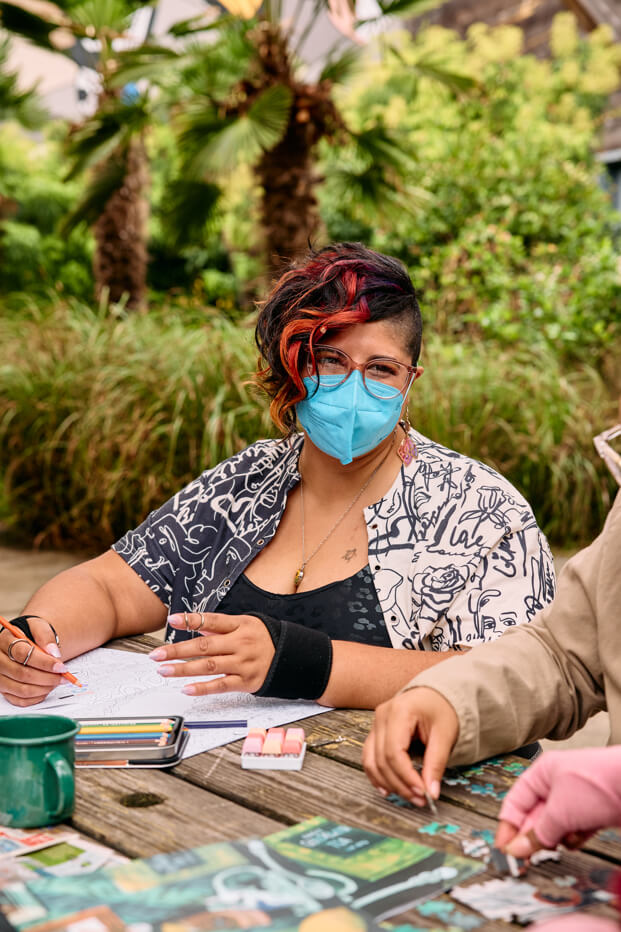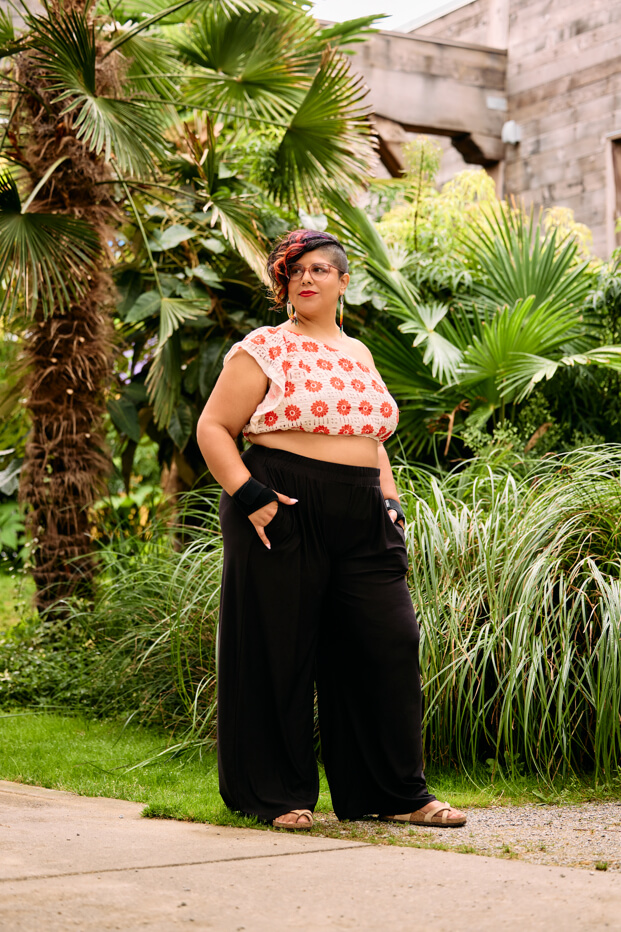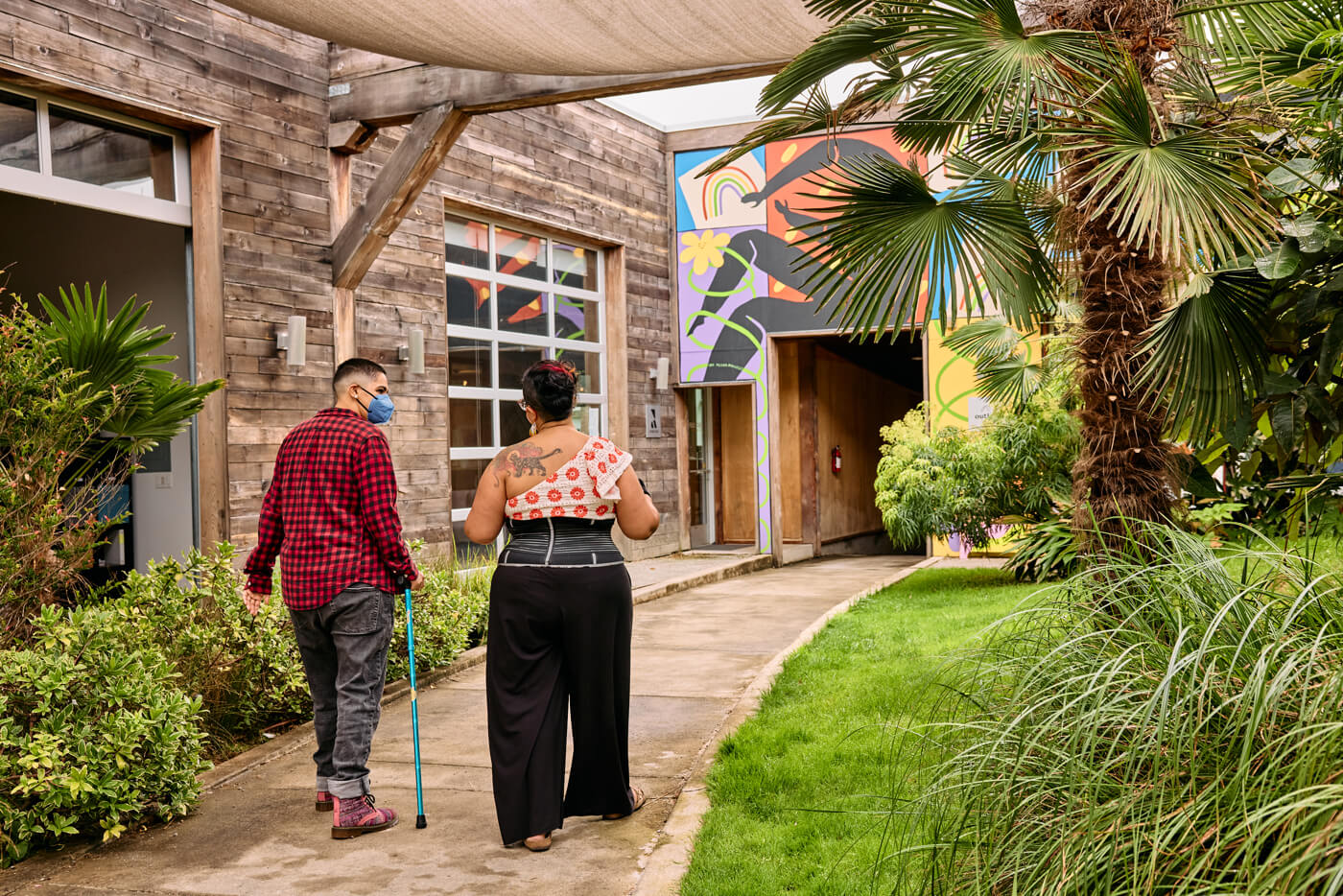October 2, 2024
Disabled And Here: Interview with Jesenia
Hi! How would you like to introduce yourself? Hi, my name is Jesenia pronounced Jess–eN–ee–Ya. I’m a queer first-generation Indigenous-Venezuelan-American, AutiHD (Autistic & ADHD), living with Ehlers-Danlos Syndrome. I’m an artist, community builder & organizer, disability advocate, scientist, cultural producer and activist.

I founded OneFreeCommunity.com, an online community center connecting decolonizing people to community & building mutual aid initiatives together. My disability advocacy is with Women Enabled International, as part of the US Gender & Sexual Reproduction Disability Justice Alliance, and I recently completed the 2024 Emerge Fellowship with the Longmore Institute on Disability. I serve as a Communications Producer with Calling Up Justice.
With my consultancy, NeuroSpicy Networking, I regularly teach workshops on conflict resolution, access inclusion, creating neuro-affirming spaces & speeches, talks, podcasts, and more.
Ooh, how did the term “NeuroSpicy Networking” come about and what does it mean to you? This is actually due to active suppression happening online. Social media companies are private companies that have no incentive in this supremacist culture to support or protect historically marginalized folx. Many of these platforms go out of their way to suppress POC even when we work to support each other.
Neurospicy is an algospeak term born out of TikTok suppressing words like “Neurodivergent” and “Autistic” from being pushed to the for you page (fyp). The term NeuroSpicy was created by the neurodivergent community to subvert human-driven suppression to connect and reach each other.
My goal is to find and connect with neurodivergent folx who want to learn about networking. Networking is a powerful skill that is needed for minorities to survive under these oppressive systems designed to keep us out of access to wealth and business, and I want to help others in my community learn these skills and tap into the abundance we have to share with each other.
As the creator of One Free Community, can you tell us more about that and share a couple of your favorite projects and/or digital spaces you’ve been part of? One Free Community started as a group of neurodivergent femmes looking to make a mutual aid matching app and hundreds of people joined looking for community, so we split the group into the app and the community. OFC has various events such as movie nights, conversation spaces, ND business chat, or grant writing coworking spaces.

Some of my favorite projects are:
- Accessible Virtual Pride in collaboration with Calling Up Justice: uniting COVID-cautious LGBTQAI2S+ and allies! This year our event included an art gallery, Gathertown space, workshops, vendor booths, and a livestream event.
- DiVergent for Community: this event explores leadership styles, nurtures authentic professional expression, and embraces our true neurodivergent selves in a tranquil setting away from the hustle and bustle of daily life.
- Virtual Protests: part of my 2024 Emerge Fellowship; this project is for everyone who can’t physically attend protests to join our anti-genocide virtual gatherings serve as a vital platform to express grief, stand in solidarity, and engage in meaningful action against ongoing humanitarian crises.
Given all the organizing and community building, what are some ways you like to relax or just recharge? This is a hard question because I always need more rest! I am always trying to remind myself “Rest is resistance,” and there are so many ways to rest, but lately I’ve been struggling to rest. I work on crip time, which honors the fluctuating energy levels or spoons I may have each day. I take naps when I need to, walk, or sit in the sun when I can.
I’m an ambivert, so I can recharge alone or in the company of friends. I’m hyperverbal, so I love to have conversations with people about the world we want to make possible! I love growing relationships and building new projects with other disabled folx.
I love dreaming of the future as if we already won collective liberation and what’s left is figuring out how we build a world where everyone has a thriving life. Where we move towards honoring inherent worth and away from the violence of measuring people’s worth by their productivity. Making art, dreaming bigger, singing louder, finding joy daily is how I try to relax and recharge.
As I was looking through Disabled And Here photos, I loved how your disability aids were complementary to your whole look. How would you describe your fashion sense or style? My fashion changes as I do, but most of the time I love being bold, bright and taking up space! Since I’ve been plus-size my whole life, I’ve been told to shrink myself and I refuse! Finding clothes that are fashionable and fit was hard enough, but now as a late-realized femme-autist, it is nearly impossible to find clothes that are plus-size, fit well, made with natural fibers.
I’m tired of the very limited options and then being shapeless and floral, and not even a fun floral, but your grandma’s drapes made into clothes, UGH! How many plus-size clothing designers have I followed over the years, who can’t get the factories to produce their styles, or it is so cost prohibitive they can’t sell their items?!

It’s maddening that we make up over 50% of the population, but only 20% of the industry bother to make a half-assed attempt at making clothing for us. And now many stores are discontinuing their extended sizes offerings in-store, so we are going backwards in progress. The options currently are either: buy environmentally destructive fast-fashion OR inhumane slave labor made clothing that is made of plastic and falls apart in 6 months. This is not what we want!
I learned to sew at a young age to make my own clothes that fit, but with deteriorating health and low spoons, that’s no longer an option for me. I want to buy clothes that are custom-made for my body, that change with my body over time. Clothes that have bright patterns; are soft, breathable; and come with big pockets. My fashion is more interested in the female gaze and the queer gaze. Subverting expectations & taking up space helps me feel confident in a world that is actively normalizing violence towards us.
LOVE THAT. Similarly, if you were to create a more accessible world, what are some must-haves? We can create a world where everyone’s access needs are considered and met when we center the most marginalized in all that we do. This is the world I work to create. We must reconnect and rebuild communities, bring back Indigenous practices, return land back to the original stewards, and decolonize our systems.
Must-haves in these communal-centric systems are universal income, universal healthcare, easy access to healthy non-processed food, free housing, and centering disability justice as the standard. Design all systems, tools, and buildings from beginning to end with the disability community. By incorporating the 10 principles of disability justice globally, we can create access and acceptance that ensures liberation for all.
Things everyone can do today is make all buildings accessible – doorways; all bathrooms; ramps in all areas, not just one entry in the alley by the dumpsters. A variety of seating options in every building, mask mandates during ongoing pandemics, closed captions, and ASL interpreters at all events. Sensory-safe spaces, wider sidewalks with curb cuts, dedicated bike lanes, remove car-centric areas, and build more accessible public transportation. There is so much more I can say, but we live in a world of abundance and ingenuity. All it takes is for people to decide we care about each other and act in ways to build the reality we want now.

Is there anything else you’d like to share as we wrap up? Everything we have built has been with little to no money. We created these projects and spaces with what we have, with the capacity we have.
I coined the term Collaborative Spoonie Model for the way we have been working and building communities and events honoring our spoons. What we have built has been in community with the support of crip ingenuity and tenacity. I want people to learn what it is to BE in community with each other, to not “throw us away”, and to see what we can do when we believe together.
Final question: what are the best ways to support you and your work? I operate on a radical generosity model that allows folx to pay what they can afford. Donations support my efforts to provide services to low-income & historically marginalized clients! If you would like to make a donation to support my work, you can make a one time donation with Buy Me a Coffee or become a monthly sponsor on my Patreon.
This interview has been edited for clarity and length.